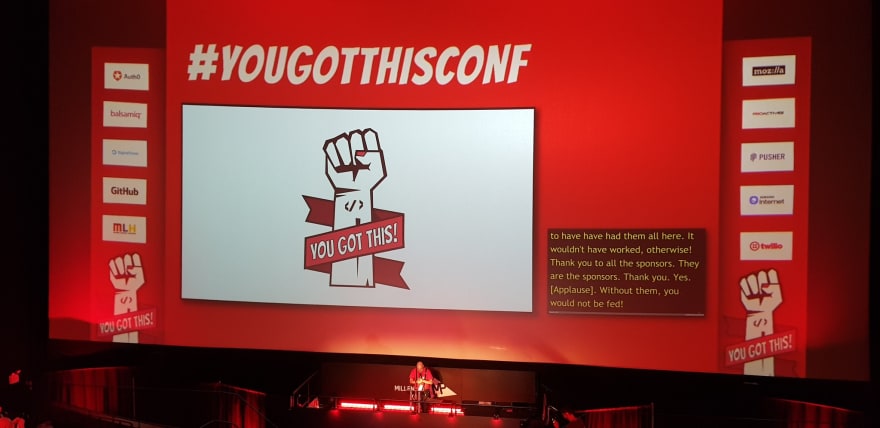I've just got back from what must be one of the best tech conferences going, and what makes it so special is that it isn't even really about tech. YouGotThis is an annual, single-stream, "tech" conference which focusses on the oft-forgotten "core skills" that are key to working in tech in a way that is both healthy and productive. It's aimed at early career developers, be those junior devs or people that are still looking for that first role, but I actually think that much more senior developers and managers could really benefit from attending. In fact, I think that a lot of what was covered in the talks is relevant far outside of tech specific roles and everyone could benefit from attending!
TOC
The Event

Photo: Venues of Excellence
This year the conference took place in Birmingham at Millennium Point. It was really great to see a conference like this take place outside of London, shining a light on the tech world outside of Silicon Roundabout. Underland, who organised the event, did a fantastic job at making the event truly accessible. The toilets inside the event area were all gender neutral, with typical toilet facilities available elsewhere in the venue, and attendees all wore name badges with a pronouns field. All of the food was vegan and the event was a dry event. They also offered a couple of schemes to widen the event up to under represented groups. Ticket scholarships were offered for these groups which included, but wasn't limited to:
LGBTQIA+ people, people of colour, women, non-binary people, and those with disabilities.
This was funded in part by other attendees buying an extra ticket alongside their own which could then be used in this scholarship scheme. Underland also offered full scholarships which covered travel and accommodation alongside the ticket cost.
These little touches do a great job of making the event far more accessible to people who might otherwise feel excluded. All of the information about their inclusion work for the event can be found at https://2020.yougotthis.io/inclusion
Topics
Photo: Underland Events
There were 9 separate talks on at the event:
- It's not your job to love your job - Keziyah Lewis @KeziyahL
- Learning to invest in your future - Matthew Gilliard @MaximumGilliard
- How to find your perfect mentor - Amina Adewusi @a_adewusi
- So good they can't ignore you! - Gargi Sharma
- Level up: Developing developers - Melinda Seckington @mseckington
- Making your first days count - Nathaniel Okenwa @chatterboxCoder
- Company culture, performance reviews and you - Ruth Lee @yoursruthlessly
- Unions got this: Organising the tech trade - Dan Parkes
- Real talk about when to walk away - Amy Dickens @RedRoxProjects
I'm not going to write up all of these talks word for word, because that feels a lot like plagiarism and I honestly couldn't do them justice. What I would like to do though is summarise the key themes that I found across all the talks.
Your needs ≠ your workplace's needs
Now, this one isn't always true, especially if you're a freelance developer that works for themselves. But for a lot of developers, we're working for companies that want to sell themselves to their employees, investors and customers are being revolutionary, game changing forces for good. The reality though is that we live in a capitalist world and the company doesn't care about you. Your manager might care about you. Your colleagues might care. Even the CEO might care. But the company is an entity whose sole purpose is to maximise its own value above all else. Keziyah Lewis, Ruth Lee and Amy Dickens all covered this in great detail.
This isn't to say that your company is your enemy. What it does mean though is that you need to make sure to look after yourself, because the company won't do it for you. For example, a performance review is not a ground truth, objective analysis of your skills. What it is, is a way for your colleagues, managers and other associates to provide feedback that then assesses how you fit the company's culture. A well established company or team will have different values and a different culture to something like a start up. Remembering this is the best way to make sure you're both in the right role and company for you, and to properly assess how your strengths suit the needs of that role/company.
Build a personal brand
So it should be noted that I'm both British and introverted, so things like "building a personal brand" trigger some sort of deep rooted suspicion inside me, and before attending YouGotThis I'd probably have listened to it. But so many people mentioned it and extolled its virtues that I think I need to give it a second chance.
For me, building a personal brand seems to be about establishing and defining who you are. Your values, your goals, your needs. It's only after you've started to sketch these things out that you can really start to put in the time required to make sure you're both being your best and getting the best out of your job. Once you've started to work on this you can find the right company to work for, find your working style, figure out the best way to learn, make sure you're being recognised for the work you do, and then so much more. It helps you in planning for the future, assessing the present and reflecting on the past.
Make a Brag Doc
I had never heard of a brag doc before attending this conference, but following Gargi Sharma's talk where she mentioned it, almost every speaker afterwards brought it up. There's a really great blog post about building a brag doc by Julia Evans that Gargi mentioned. I'll leave that here (https://jvns.ca/blog/brag-documents/) instead of writing it all out again and you should definitely give it a read.
By building a brag doc, you're highlighting your skills and your work. There are all sorts of tasks that you do every day, big and small, that might go unrecognised unless you point them out and brag about them. Also, you won't remember everything you did in the last week/month/quarter unless you make a note of them. Maybe put together some important documentation or made a small improvement to the codebase that fixed a security hole. Write it down, share it with your manager and your colleagues that give you feedback. They're just as human as you and they're bound to forget most of the work you've done recently. All you're doing by sharing your doc is reminding them of the things you so that they can be reminded of how awesome you are!
Work with your manager
Your manager is there to help support you in your journey as a developer. A great example of this is from Melinda Seckington's talk about how your engineering manager can help you to develop by using ideas from game design. Right the way from starting a new game (joining the company) through to leveling up (developing your skills), your manager is in a great position to help you out through fast and constructive feedback and providing plenty of opportunities for you to develop your skills.
Nathaniel Okenwa's talk about settling into a new role and then accelerating your growth highlighted building a productive working relationship with your manager as a key component of the first of three phases in starting a new role. (The three phases he focused on were Observe, Understand and Create).
So with all that in mind take some time to build a good relationship with your manager. They're not just there to tell you what to do.
Be part of the community
Maybe this comes in part from being at a conference, but there was definitely a running background theme across the talks about being involved in the tech community. Whether it was Amina Adewusi's talk about the benefits of finding and being a mentor, Matthew Gilliard's advice to use social learning as a way to improve, or Gargi's tips for networking as an introvert by writing a blog or leveraging one on one conversations to build connection, being part of the tech community is a great way to "level up" as a developer.
This blog is actually my first step towards doing this. I'm hoping that by writing this blog, I can build up my network and contribute towards the tech community. With that in mind, I'll be posting in the next few weeks about other steps I want to take towards giving back to the community and being part of it.
You are more than your job!
One of the most important things to come out of this conference was about respecting yourself and your needs. You need to make sure that whatever you do in your job, you're doing it for you as well as your company, and that you're maintaining a healthy work/life balance. The value that you gain from this benefits you and them.
And the best way to do this is to implement some of the ideas above. Figure out who you are, build a brag doc to highlight your strengths and the work you do, work with your manager to develop yourself and be part of the community.
I'm going to follow up this blog post with some of the specific things I'm going to be doing in 2020 to try and follow through on what I've learnt.
I'm also going to (eventually) get this up on my own blog. So when that happens I'll keep you posted about it :)
Thanks,
Josh



Top comments (2)
Thank you so much for this thoughtful write-up. Hopefully we'll see you next year!
Thanks for sharing this summary Josh. It was lovely to read and re-live the conference experience, having attended as well this year. 🤩